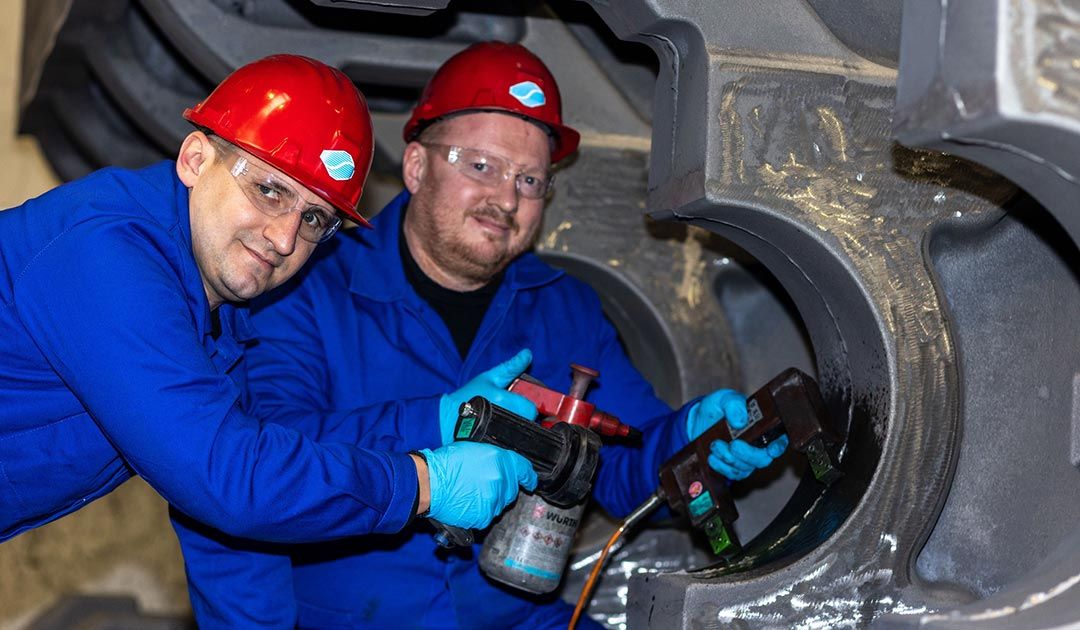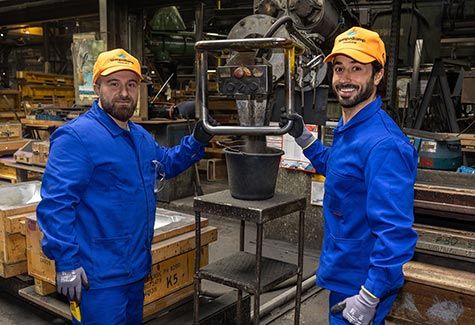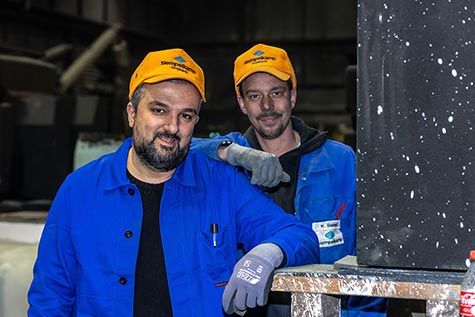Lighthouse project partial qualification

Partial qualification as foundry mechanic
Pragmatic lighthouse project against the shortage of skilled workers
Krefeld, March 7, 2023
They come from Syria, Kazakhstan, Georgia or Turkey, were unemployed or had no per-spectives in their jobs: But thanks to the training offensive of the Krefeld Siempelkamp Foundry, a total of 20 new employees have now taken an important step into a new career. On March 1, they started their partial qualification as foundry mechanics at the world market leader for hand-moulded castings.
Attractive variant of qualification-oriented training
The participants of this measure are already employed by Siempelkamp Foundry during the six-month training and can obtain a corresponding certificate after completing the partial quali-fication as foundry mechanic (TQ 1). In the search for suitable candidates for the partial qualification, Siempelkamp Foundry worked together with the Federal Employment Agency Krefeld a very focused yet pragmatic way. Thanks to the close cooperation and the support of the agency management as well as the entire Krefeld team, this lighthouse project could be successfully realised.
It is thus also pointing the way for other SMEs in the region, as partial qualification is an attractive variant of qualification-oriented training. The project was supported not only by Siempelkamp Giesserei and the Federal Employment Agency Krefeld, but also by the Lower Rhine Chamber of Industry and Commerce. The Teutloff Bildungszentrum, with its long experience in the field of training and further education in the foundry sector, supports the Siempelkamp Foundry as a training provider and trains the participants on site in Krefeld.

Attractive salary security and good prospects for the future
Within the framework of the partial qualification, the new employees experience particularly intensive support. Thomas Handke, project manager at Siempelkamp Foundry, has 34 years of professional experience and cares intensively for the needs of the new colleagues: "We take a lot of time for the participants of the partial qualification by establishing a training supervisor in each of our work areas for their support. Our foremen are also fully committed to supporting the colleagues, many of whom are new to the field, in the best possible way when they start their new jobs." explains Handke. It is important to recognise strengths at an early stage and to promote them.
The 20 prospective foundry mechanics previously worked as hairdressers, hotel clerks or in retail. They also include university graduates whose degrees are not recognised in Germany. "For many of them, the minimum wage was no longer enough to provide for their families in the face of rising inflation. Some were also exploited by their former employers. With us they hope for good pay for honest work, a regular working life in fixed shifts and, of course, security for the future," Handke clarifies. The Siempelkamp Foundry profits from an increasing demand for large structural components for the production of electric vehicles, LNG ships or innovative cement mills. Due to its strategy, Siempelkamp Foundry is in need of additional skilled workers, and in this context it is also important to break new and previously unavailable ground.
Win-Win- situation with a focus on integration
"We are very happy to have created a win-win situation for everyone with the partial qualification. On the one hand, we benefit from concentrated manpower for our exciting projects, and on the other hand, we offer unskilled workers and the professionally unlucky a new career and social perspective, regardless of their origin," explains Dr Georg Geier, managing director of Siempelkamp Foundry.
Integration in particular plays an important role in the partial qualification. Some of the new employees still have problems with the German language and have not yet had the opportunity to learn German. The work in the team at Siempelkamp Foundry is now also intended to specifically remedy language deficits. In addition to special German lessons, the company relies on the power of communication: "Constant communicative exchange is the key in a challenging environment like a foundry. Due to their training, the new colleagues will talk a lot among themselves and with the experienced employees," explains Thomas Handke.
The foundry also hopes that the partial qualification will provide many in-sights for its recruiting process. "The new colleagues bring a lot of different experience with them. Of course, we will also benefit from this training. Metalworkers or logisticians who have now found their way to us through the partial qualification can certainly contribute to further optimising our own processes," explains managing director Georg Geier.

"We are very happy to have created a win-win situation for everyone with the partial qualification."
Dr. Georg Geier, Managing Director of Siempelkamp Giesserei GmbH
About Siempelkamp Giesserei
Siempelkamp is a globally active group of companies with the business units Mechanical and Plant Engineering, Casting Technology, and Nuclear Engineering. Nearly 3,000 employees worldwide ensure that the Siempelkamp Group is represented among the world leaders with its technologies.
Siempelkamp Giesserei GmbH in Krefeld specializes in the production of hand-molded large castings of up to 320t made of cast iron with nodular graphite and is one of the largest hand-molding foundries in the world. The comprehensive and customer-oriented service package includes the entire production process from design, calculations, pattern making, molding and casting to mechanical processing as well as packaging and transport.
